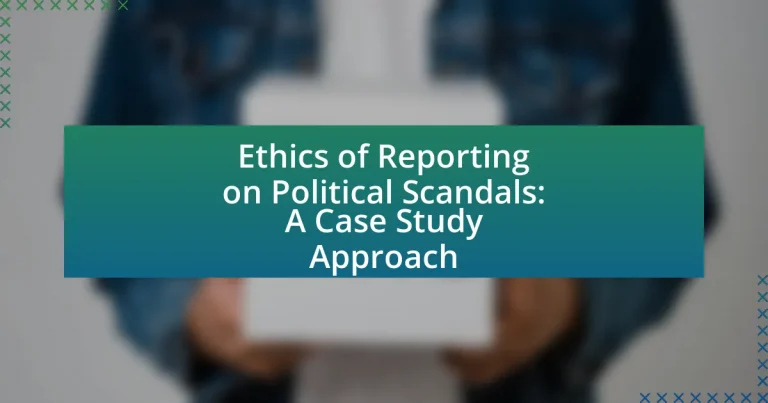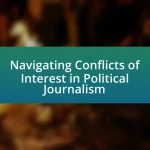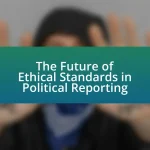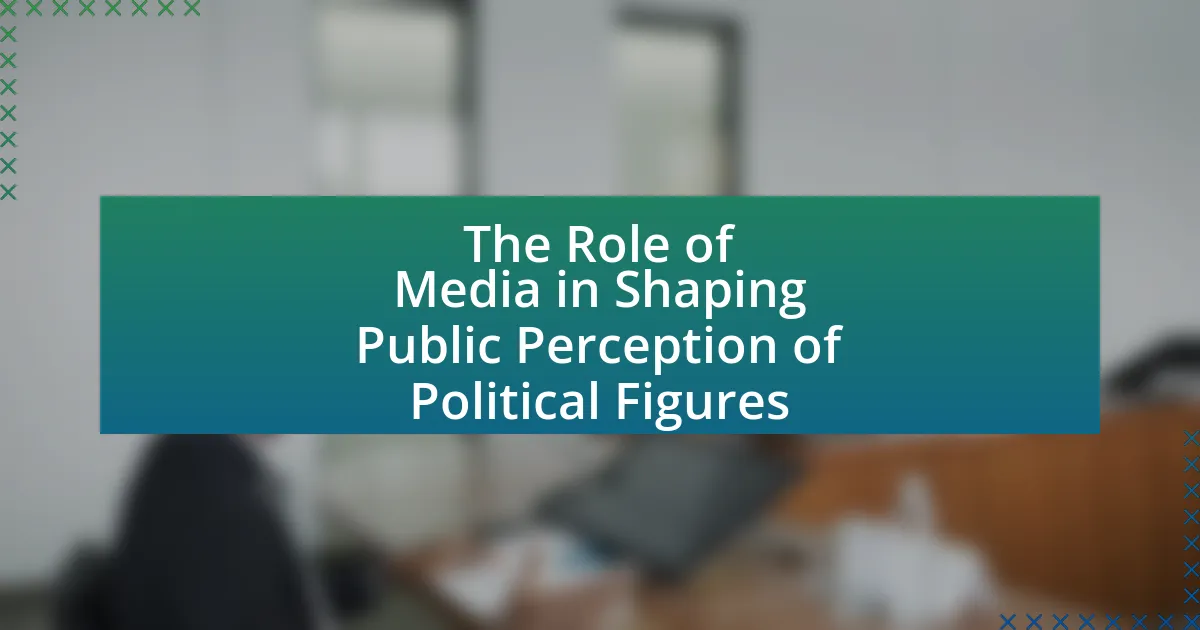The article examines the ethics of reporting on political scandals, emphasizing the importance of truthfulness, fairness, and accountability in journalism. It outlines key ethical principles such as accuracy, impartiality, and independence, which guide journalists in their reporting practices. The discussion includes the impact of ethical considerations on public trust, the challenges journalists face, and the consequences of unethical reporting on political outcomes. Additionally, it highlights best practices for maintaining ethical standards, including transparency and responsible source disclosure, while providing case studies that illustrate ethical dilemmas in political journalism.
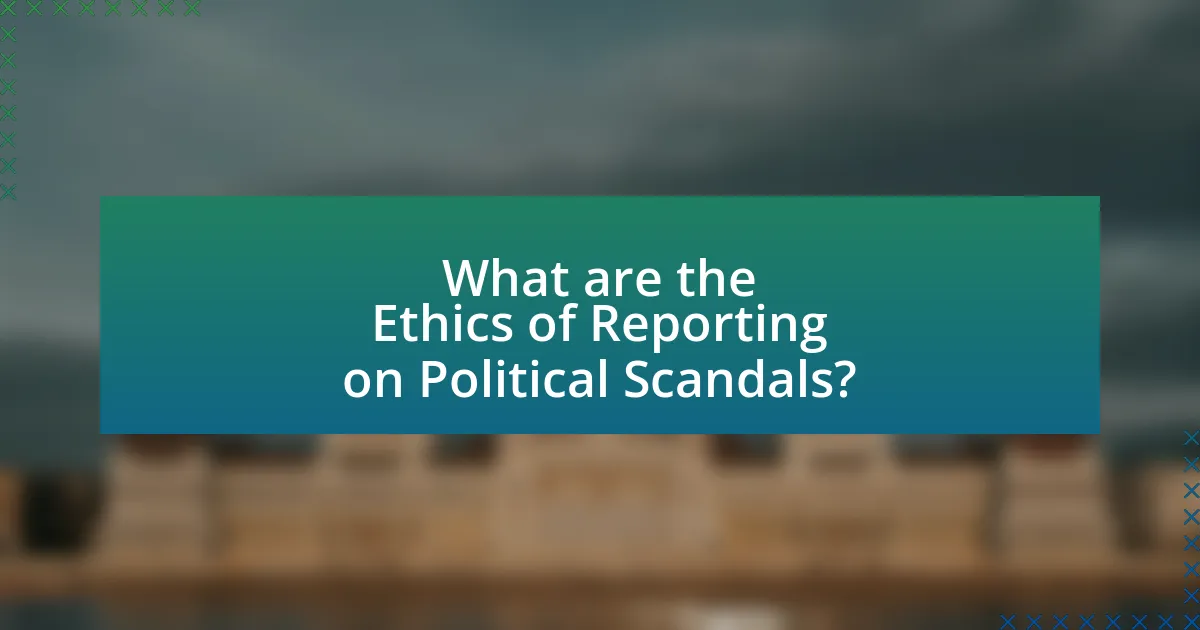
What are the Ethics of Reporting on Political Scandals?
The ethics of reporting on political scandals involve a commitment to truthfulness, fairness, and accountability. Journalists must ensure that their reporting is based on verified facts to avoid spreading misinformation, which can harm public trust and democratic processes. Ethical guidelines, such as those outlined by the Society of Professional Journalists, emphasize the importance of minimizing harm, providing context, and avoiding conflicts of interest. For instance, the Watergate scandal highlighted the necessity for investigative journalism to uphold ethical standards, as it revealed significant governmental misconduct while also raising questions about the implications of sensationalism and privacy invasion in reporting.
Why is ethical reporting crucial in political journalism?
Ethical reporting is crucial in political journalism because it ensures accuracy, accountability, and public trust. When journalists adhere to ethical standards, they provide reliable information that enables citizens to make informed decisions about their governance. For instance, the Society of Professional Journalists emphasizes the importance of seeking truth and reporting it, which is foundational for democracy. Ethical lapses can lead to misinformation, which can distort public perception and undermine democratic processes, as seen in various political scandals where biased reporting influenced voter behavior. Thus, ethical reporting not only upholds journalistic integrity but also protects the democratic framework by fostering an informed electorate.
What principles guide ethical reporting in journalism?
Ethical reporting in journalism is guided by principles such as accuracy, fairness, independence, and accountability. Accuracy ensures that information is verified and presented truthfully, which is crucial in maintaining public trust. Fairness involves providing balanced perspectives and representing all sides of a story, particularly in politically sensitive contexts. Independence requires journalists to remain free from influences that could compromise their objectivity, while accountability holds journalists responsible for their work and its impact on society. These principles are essential for fostering credibility and integrity in journalism, especially when reporting on political scandals, where the stakes are high and misinformation can have significant consequences.
How do ethical considerations impact public trust in media?
Ethical considerations significantly impact public trust in media by shaping perceptions of credibility and integrity. When media outlets adhere to ethical standards, such as accuracy, fairness, and transparency, they foster a sense of reliability among audiences. For instance, a study by the Pew Research Center in 2021 found that 65% of Americans believe that ethical journalism enhances trust in news organizations. Conversely, unethical practices, such as sensationalism or misinformation, erode public confidence, leading to skepticism and distrust. This relationship underscores the importance of ethical reporting, particularly in politically charged contexts, where the stakes are high and public perception can be easily influenced.
What challenges do journalists face when reporting on political scandals?
Journalists face significant challenges when reporting on political scandals, including issues of credibility, access to information, and legal repercussions. Credibility is paramount, as journalists must ensure that their sources are reliable and that the information presented is accurate to maintain public trust. Access to information can be limited due to government secrecy or the reluctance of individuals involved to speak out, making it difficult to gather comprehensive details. Legal repercussions, such as potential lawsuits for defamation or breaches of confidentiality, can deter journalists from pursuing certain stories. These challenges are compounded by the fast-paced nature of news cycles, which can pressure journalists to publish quickly, sometimes at the expense of thorough fact-checking.
How do biases influence the reporting of political scandals?
Biases significantly influence the reporting of political scandals by shaping the narrative and framing of events. Journalists’ personal beliefs, organizational affiliations, and audience expectations can lead to selective emphasis on certain facts while downplaying others, ultimately affecting public perception. For instance, studies have shown that media outlets with partisan leanings often portray political figures in a light that aligns with their ideological stance, which can skew the audience’s understanding of the scandal. A notable example is the coverage of the Watergate scandal, where different news organizations highlighted varying aspects based on their political biases, influencing public opinion and trust in government.
What role does sensationalism play in political reporting?
Sensationalism plays a significant role in political reporting by prioritizing dramatic and attention-grabbing narratives over factual accuracy. This approach often leads to the exaggeration of events or the framing of political figures in a negative light, which can distort public perception and influence voter behavior. For instance, studies have shown that sensationalist headlines can increase readership and engagement, as evidenced by a 2018 analysis from the Pew Research Center, which found that sensational news stories received significantly more shares on social media compared to balanced reporting. Consequently, sensationalism can undermine the integrity of political discourse by fostering misinformation and polarization among the electorate.
How can case studies illustrate ethical dilemmas in political reporting?
Case studies can illustrate ethical dilemmas in political reporting by providing real-world examples that highlight the complexities and consequences of journalistic decisions. For instance, the Watergate scandal case study demonstrates how reporters faced the ethical dilemma of balancing the public’s right to know against the potential harm to individuals involved. This situation required journalists to navigate issues of confidentiality, the impact of their reporting on political stability, and the moral implications of exposing wrongdoing. Such case studies serve as critical learning tools, revealing the nuanced challenges journalists encounter and the ethical frameworks they must consider when reporting on sensitive political issues.
What are notable examples of ethical breaches in political journalism?
Notable examples of ethical breaches in political journalism include the coverage of the 2003 Iraq War, where journalists like Judith Miller of The New York Times reported unverified claims about weapons of mass destruction, leading to widespread misinformation. Another example is the 2016 election coverage, where outlets like CNN faced criticism for airing unverified allegations against Donald Trump, which raised questions about journalistic integrity. Additionally, the case of Stephen Glass, a former journalist for The New Republic, exemplifies ethical breaches through fabricated stories that misled readers and damaged the publication’s credibility. These instances highlight significant lapses in ethical standards within political journalism, emphasizing the need for accountability and fact-checking in reporting.
How have case studies shaped the understanding of ethical reporting?
Case studies have significantly shaped the understanding of ethical reporting by providing concrete examples of ethical dilemmas and decision-making processes in journalism. They illustrate the complexities journalists face when reporting on political scandals, highlighting the balance between public interest and individual privacy. For instance, the case study of the Watergate scandal demonstrates how investigative reporting can uphold democratic accountability while also raising ethical questions about the methods used to obtain information. Such case studies serve as critical learning tools, allowing journalists to analyze past mistakes and successes, thereby refining ethical standards and practices in reporting.
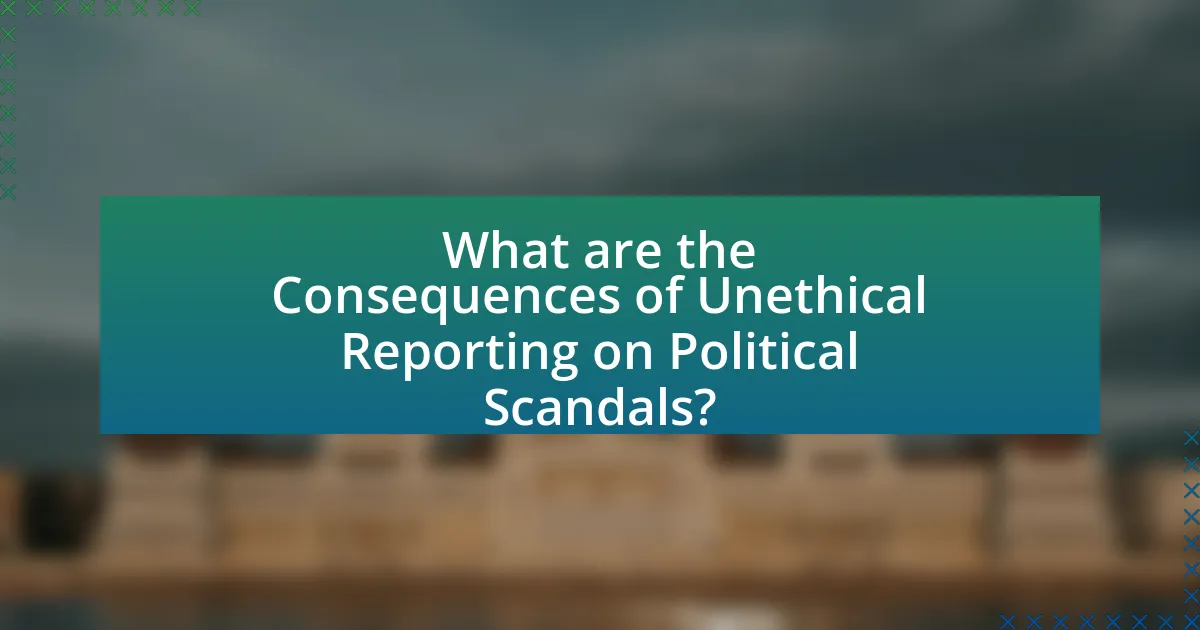
What are the Consequences of Unethical Reporting on Political Scandals?
Unethical reporting on political scandals leads to significant consequences, including the erosion of public trust in media, the potential for misinformation to influence public opinion, and the undermining of democratic processes. When journalists prioritize sensationalism over accuracy, they can misrepresent facts, which may result in the public forming opinions based on false narratives. For instance, a study by the Pew Research Center found that 62% of Americans believe that news organizations are often influenced by political biases, which can diminish the credibility of the press. Additionally, unethical reporting can lead to legal repercussions for media outlets, as seen in cases where defamation lawsuits arise from false reporting. Ultimately, these consequences can destabilize political discourse and hinder informed citizen engagement in democratic processes.
How does unethical reporting affect political outcomes?
Unethical reporting significantly distorts political outcomes by misrepresenting facts and influencing public perception. For instance, sensationalized or biased coverage can lead to misinformation, which may sway voter opinions and alter election results. A notable example is the 2016 U.S. presidential election, where misleading headlines and false narratives circulated widely, impacting voter behavior and trust in candidates. Studies indicate that exposure to biased media can reinforce existing beliefs, further polarizing the electorate and undermining democratic processes. Thus, unethical reporting not only shapes immediate political landscapes but also erodes the foundational trust necessary for a functioning democracy.
What are the potential repercussions for journalists involved in unethical reporting?
Journalists involved in unethical reporting may face severe repercussions, including loss of credibility, legal consequences, and professional sanctions. Loss of credibility occurs when the public and peers question the journalist’s integrity, leading to diminished trust and potential job loss. Legal consequences can arise from defamation lawsuits or breaches of confidentiality, which can result in financial penalties or imprisonment. Professional sanctions may include suspension or expulsion from journalistic organizations, as seen in cases where journalists have fabricated sources or manipulated facts, undermining the ethical standards set by organizations like the Society of Professional Journalists.
How can unethical reporting damage the reputation of media organizations?
Unethical reporting can severely damage the reputation of media organizations by eroding public trust and credibility. When media outlets engage in practices such as misinformation, sensationalism, or biased reporting, they risk alienating their audience and losing their integrity. For instance, a study by the Pew Research Center found that 70% of Americans believe that news organizations are often influenced by political bias, which can lead to skepticism about the accuracy of reported information. This skepticism can result in decreased viewership and readership, ultimately harming the financial viability of the organization. Furthermore, unethical reporting can lead to legal repercussions and public backlash, as seen in high-profile cases where media organizations faced lawsuits for defamation or inaccuracies, further tarnishing their reputation.
What are the legal implications of reporting on political scandals?
Reporting on political scandals can lead to legal implications such as defamation lawsuits, invasion of privacy claims, and potential violations of confidentiality agreements. Journalists must ensure that their reporting is accurate and substantiated to avoid legal repercussions; for instance, false statements about a public figure can result in significant financial damages if proven defamatory. Additionally, the First Amendment provides some protections for journalists, but these protections are not absolute, particularly when it comes to private individuals versus public figures. Courts often require public figures to prove actual malice in defamation cases, which underscores the importance of rigorous fact-checking and ethical reporting practices.
What laws govern the reporting of political scandals?
Laws governing the reporting of political scandals primarily include defamation laws, privacy laws, and freedom of information statutes. Defamation laws protect individuals from false statements that could harm their reputation, requiring journalists to ensure accuracy in their reporting. Privacy laws restrict the disclosure of private information without consent, impacting how scandals are reported. Additionally, freedom of information laws allow journalists access to government documents, facilitating transparency in political reporting. These legal frameworks are essential for maintaining ethical standards in journalism while balancing the public’s right to know.
How do defamation and libel laws impact journalistic practices?
Defamation and libel laws significantly impact journalistic practices by imposing legal risks on journalists who publish potentially harmful statements about individuals or organizations. These laws require journalists to ensure the accuracy of their reporting, as failure to do so can result in costly lawsuits and damage to their credibility. For instance, the landmark case New York Times Co. v. Sullivan established that public figures must prove actual malice to win a defamation suit, which has led journalists to adopt more rigorous fact-checking and editorial standards to avoid legal repercussions. Consequently, these laws shape the ethical landscape of journalism, compelling reporters to balance the public’s right to know with the need to protect individuals from false and damaging claims.
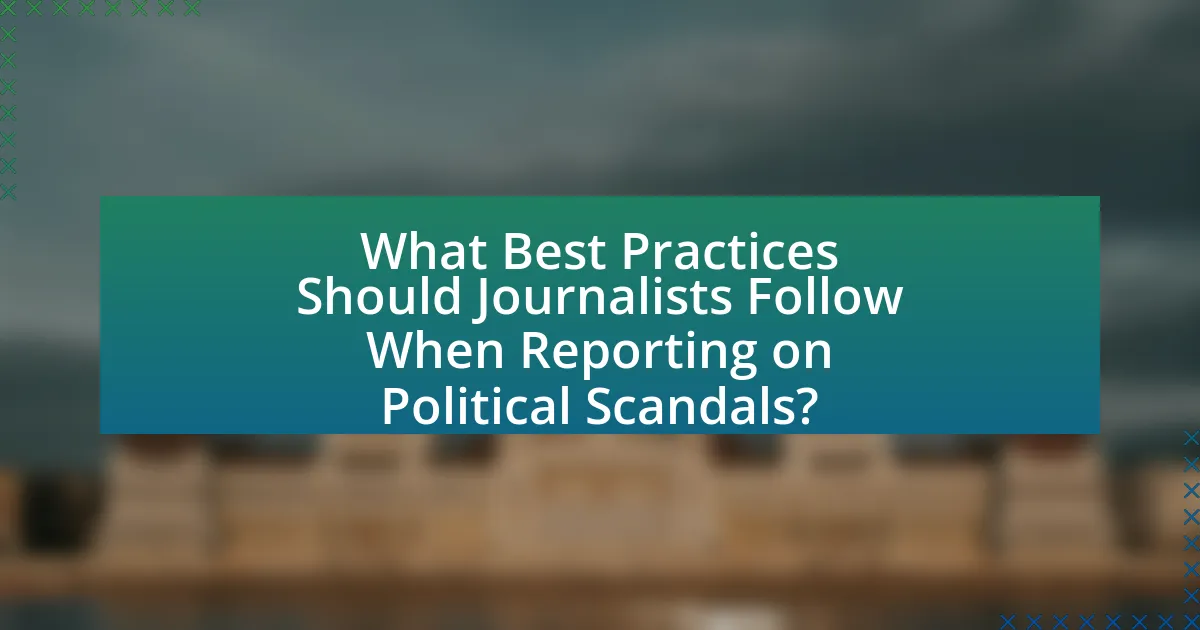
What Best Practices Should Journalists Follow When Reporting on Political Scandals?
Journalists should prioritize accuracy, impartiality, and thorough investigation when reporting on political scandals. Accuracy ensures that all facts are verified before publication, reducing the risk of misinformation. Impartiality involves presenting multiple viewpoints and avoiding bias, which is crucial in maintaining credibility. Thorough investigation requires journalists to gather evidence from reliable sources, including documents, eyewitness accounts, and expert opinions, to provide a comprehensive understanding of the scandal. For instance, the Watergate scandal exemplified the importance of these practices, as investigative journalists Bob Woodward and Carl Bernstein relied on meticulous fact-checking and diverse sources to uncover the truth, ultimately leading to significant political consequences.
How can journalists ensure accuracy and fairness in their reporting?
Journalists can ensure accuracy and fairness in their reporting by adhering to rigorous fact-checking protocols and maintaining impartiality. Fact-checking involves verifying information from multiple credible sources before publication, which helps prevent the dissemination of false information. For instance, a study by the American Press Institute found that 88% of journalists believe that fact-checking is essential for maintaining credibility. Additionally, journalists should strive to present multiple viewpoints, especially in politically charged topics, to provide a balanced perspective. This approach not only enhances fairness but also fosters trust with the audience, as evidenced by research from the Pew Research Center indicating that audiences are more likely to trust news organizations that present diverse opinions.
What fact-checking methods are essential for ethical reporting?
Essential fact-checking methods for ethical reporting include source verification, cross-referencing information, and utilizing fact-checking organizations. Source verification involves confirming the credibility of the sources cited in a report, ensuring that they are reliable and authoritative. Cross-referencing information entails comparing multiple sources to corroborate facts, which helps to identify discrepancies and validate claims. Utilizing fact-checking organizations, such as PolitiFact or FactCheck.org, provides an additional layer of scrutiny, as these organizations specialize in assessing the accuracy of public statements and media reports. These methods collectively enhance the integrity of reporting, particularly in the context of political scandals, where misinformation can have significant consequences.
How can journalists balance the public’s right to know with privacy concerns?
Journalists can balance the public’s right to know with privacy concerns by adhering to ethical guidelines that prioritize transparency while respecting individual privacy. Ethical journalism requires a careful assessment of the public interest versus the potential harm to individuals involved. For instance, the Society of Professional Journalists emphasizes the need to minimize harm and consider the consequences of publishing sensitive information. This approach is supported by case studies, such as the coverage of political scandals, where journalists have successfully navigated privacy issues by focusing on information that serves the public interest without unnecessarily infringing on personal privacy.
What role does transparency play in ethical political reporting?
Transparency is crucial in ethical political reporting as it fosters trust between journalists and the public. When reporters disclose their sources, methodologies, and potential conflicts of interest, they enhance the credibility of their work. For instance, the Society of Professional Journalists emphasizes that transparency allows audiences to evaluate the reliability of information, which is essential in a democratic society where informed citizenry is vital. Furthermore, transparency helps to hold political figures accountable, as it ensures that the reporting process is open to scrutiny, thereby reducing the likelihood of misinformation and bias.
How can journalists disclose their sources responsibly?
Journalists can disclose their sources responsibly by ensuring that they have the explicit consent of the source to reveal their identity or information. This practice aligns with ethical standards in journalism, which prioritize the protection of sources to maintain trust and encourage whistleblowing. For instance, the Society of Professional Journalists emphasizes the importance of transparency and accountability, stating that journalists should seek to identify sources whenever possible, but also respect the confidentiality of those who provide information under the condition of anonymity. By adhering to these principles, journalists can balance the need for public interest with the ethical obligation to protect their sources.
What are the benefits of transparency for media credibility?
Transparency enhances media credibility by fostering trust between journalists and their audience. When media outlets openly disclose their sources, methodologies, and potential biases, they allow audiences to critically evaluate the information presented. This openness leads to increased accountability, as journalists are more likely to adhere to ethical standards when their processes are visible. Research indicates that audiences are more likely to trust media that practices transparency; for instance, a study by the Pew Research Center found that 70% of respondents believe that transparency about sources and methods is crucial for media credibility. Thus, transparency not only builds trust but also reinforces the ethical responsibility of media organizations in reporting, particularly in sensitive areas like political scandals.
What practical tips can journalists apply to uphold ethical standards in political reporting?
Journalists can uphold ethical standards in political reporting by ensuring accuracy, maintaining impartiality, and providing context. Accuracy is crucial; journalists should verify facts through multiple reliable sources before publication, as demonstrated by the Associated Press’s guidelines emphasizing fact-checking. Impartiality requires journalists to present all sides of a political issue fairly, avoiding bias, which aligns with the Society of Professional Journalists’ code of ethics. Providing context helps audiences understand the significance of political events, as seen in the reporting of the Watergate scandal, where comprehensive background information was essential for public comprehension.
